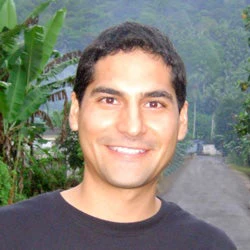
Editor’s note: Growing up in Peru, Marco Hernandez watched his country struggle under the weight of economic and political difficulties in the '80s and '90s. His childhood inspired him to pursue a career in economics, a path that led him to the World Bank. He shares his story as part of the What Inspires campaign. Follow #whatinspires and share your story on Twitter or Facebook.
Peru was in the middle of a political and economic crisis when I was a child. Terrorism had escalated, there were a lot of bombings, and we were surrounded by violence. In the late '80s, inflation rates skyrocketed to more than 1000%. There were long lines for everything, from food to fuel.
The new government was elected in 1990 and I was only 10 at the time, but I remember a speech finance minister Hurtado Miller gave, announcing that there will be significant price increases for everyone. I remember he ended his speech with the phrase “God help us all.” That was something extremely unusual, so to hear him say that shocked me. He was saying that prices would rise and there wasn’t a thing that could be done about it. I’m 34 now and I still remember those words.
Almost immediately after the speech, my father and I went to the store and stood in a very long line. But we were lucky to even be standing in a line; there were so many people who didn’t have money to buy food and sometimes there wasn’t any food to buy.
That’s when I started asking a lot of questions about money and how it works. I asked my parents how money is made, and why can’t the government just print out money to give to people so we can buy what we need? I wanted to know more about economics.
I came to the United States to study economics at MIT and worked in economic consulting in the private sector for a while. Then I wanted to learn about how economics works in the public sector and had the opportunity to work for a few months in the Ministry of Finance of Peru. I then went to the United Kingdom to get my Ph.D. at Oxford University, and after I graduated in 2008 I joined the World Bank, eventually becoming a country economist.
I came to the World Bank because I always admired its mission of eradicating poverty; I very much like that people with different backgrounds get together to try to find solutions for difficult issues. In my role, I’m in charge of monitoring the economic and social developments of a country; right now I work with Guatemala and Honduras.
I work with governments to support them with the design and implementation of their strategies and visions. Once they see the World Bank as a trusted adviser, they’re more open to work with us. And what really motivates me is to be able to make a difference for the client who wants bigger and better things for their citizens. I love being a part of that.
The Peru I see today is very different from the one I grew up in. It has been able to significantly reduce poverty in the last two decades. Poverty is still prevalent and the country faces difficult development challenges, but you can see the impact of reforms. Changes are tangible and that is something to build on.


Join the Conversation